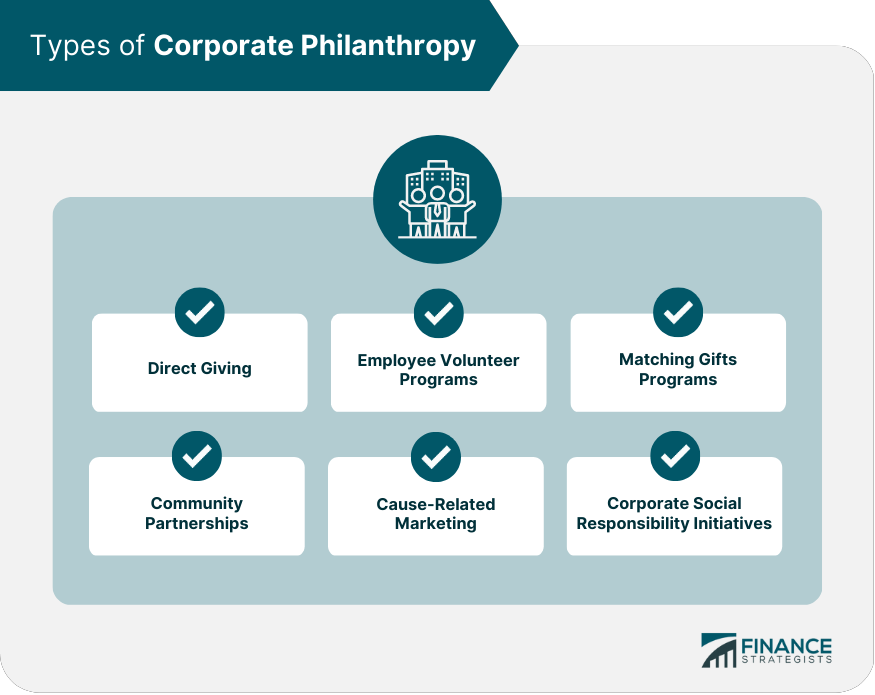Evaluating success of your corporate philanthropy strategy
Wiki Article
Exploring How Corporate Philanthropy Shapes Brand Track Record and Client Loyalty
Corporate philanthropy significantly affects brand credibility and consumer commitment. Companies that engage in genuine philanthropic initiatives often see a favorable shift in how consumers regard them. This positioning of values cultivates trust fund and psychological links with audiences. Nevertheless, the efficiency of these philanthropic initiatives can vary significantly. Understanding what genuinely reverberates with consumers is necessary for brand names looking for to enhance their social impact and market position. What techniques will become necessary for future success?The Evolution of Company Philanthropy
As services significantly acknowledge their role in society, the evolution of business philanthropy has actually changed from simple philanthropic contributions to a tactical component of brand name identification. Companies engaged in philanthropy mostly for tax obligation benefits or to improve their public photo. With time, this method changed as stakeholders-- consisting of consumers, employees, and financiers-- required a much more authentic commitment to social obligation.Organizations started straightening their philanthropic initiatives with their core values and company goals, leading to more impactful and thoughtful payments. This modification has motivated business to buy sustainable techniques and area growth, cultivating a feeling of objective that reverberates with customers.
Technological advancements have actually promoted openness and engagement, allowing organizations to display their humanitarian efforts more properly. Company philanthropy has arised as an important part of service technique, with companies welcoming the opportunity to positively affect society while enhancing their general brand name narrative.
The Influence of Philanthropy on Brand Name Perception
While firms engage in kind efforts to advertise social great, these initiatives substantially shape brand name perception amongst consumers. Business philanthropy can improve a brand's picture by linking it with positive social influence and community participation. Customers commonly perceive brands that actively take part in philanthropic activities as more trustworthy and accountable. This assumption can affect buying decisions, as customers might prefer brand names that demonstrate a dedication to social issues.
Structure Emotional Links Through Giving
Company philanthropy functions as a powerful tool for enhancing brand identification by connecting company worths with area demands. Through critical offering, firms can cultivate area involvement and develop common values that resonate with consumers on an emotional level. This technique not just reinforces brand name reputation but also constructs long-term links in between organizations and their stakeholders.Enhancing Brand Identification
When business participate in humanitarian initiatives, they not only contribute to social excellent yet also forge much deeper psychological connections with their audiences. By straightening their brand name with charitable reasons, firms boost their identity and signal values that reverberate with consumers. This alignment creates a story that goes past services and products, welcoming clients to take part in a common objective. As customers progressively prioritize purpose-driven brands, business that actively participate in giving can separate themselves in a jampacked market. Such initiatives cultivate a feeling of loyalty amongst clients that really feel directly connected to the brand's worths. Eventually, company philanthropy becomes an important device for enhancing brand identification, cultivating enduring relationships based on common ideas and emotional involvement.Fostering Community Engagement
Many studies indicate that business participating in community-focused philanthropic campaigns can substantially strengthen psychological connections with their stakeholders. By purchasing local jobs and sustaining social causes, companies cultivate a sense of belonging and trust within the community. This involvement cultivates a positive brand name picture, as clients value firms that show genuine issue for social concerns. Staff members frequently feel a lot more determined and honored to be associated with a company that focuses on community well-being. Therefore, consumers are more probable to establish commitment towards brands that actively add to purposeful reasons. Inevitably, fostering area involvement with philanthropy not only enhances brand name reputation but additionally constructs enduring emotional ties that profit both the community and the firm it serves.Creating Shared Worths
Exactly how can organizations effectively create common values that resonate with their stakeholders? Firms can attain this by straightening their humanitarian efforts with their core goal and the passions of their neighborhoods. By participating in efforts that deal with regional needs, organizations promote emotional links with customers, enhancing brand loyalty. For instance, partnering with non-profits that reflect shared values enhances the brand's photo and shows dedication to social obligation. In addition, transparent interaction about these initiatives enables stakeholders to see the concrete influence of their contributions. Inevitably, by integrating common worths right into their business philanthropy, firms not only boost their reputations however also cultivate long-term connections with customers, leading to raised loyalty and depend on. This placement is necessary in modern consumer decision-making.Instance Researches: Effective Philanthropic Campaigns
Taking a look at successful humanitarian campaigns exposes numerous techniques that improve brand name credibility. Impactful neighborhood campaigns, cutting-edge partnership versions, and long-term interaction methods have confirmed effective in promoting favorable links with consumers. These situation research studies highlight the value of thoughtful corporate giving up attaining both social and business objectives.Impactful Neighborhood Initiatives
Lots of firms have successfully leveraged humanitarian projects to improve their brand name online reputation while making a meaningful impact in their communities. A modern technology firm released an electronic proficiency program in underserved areas, supplying training and sources that encouraged neighborhood citizens. This campaign not just added to neighborhood growth yet also positioned the firm as a socially liable leader. A significant food business implemented a cravings alleviation campaign, partnering with neighborhood nonprofits to distribute dishes to households in need. This initiative enhanced community connections and fostered consumer loyalty. Through these impactful campaigns, companies have actually shown their commitment to social duty, properly aligning their brand worths with the demands of the neighborhoods they serve, ultimately boosting their general credibility.Cutting-edge Partnership Versions
The success of impactful community campaigns commonly rests on ingenious collaboration versions that unite diverse stakeholders to deal with complex social challenges. Study highlight how corporations, non-profits, and federal government entities can work together effectively. As an example, an international corporation partnered with a neighborhood non-profit to introduce an education and learning program, pooling resources and knowledge to boost area literacy rates. An additional example included a technology company and a medical care organization joining forces to create a telemedicine solution for underserved populations. These collaborations not just intensified the reach of philanthropic efforts however additionally reinforced the brands' track records by straightening their goals with area needs. Inevitably, cutting-edge collaboration versions offer as a catalyst for meaningful change and foster stronger links in between brand names and their customers.Lasting Engagement Techniques

Determining the ROI of Company Social Responsibility
As business increasingly invest in company social responsibility (CSR) efforts, recognizing the return on investment (ROI) related to these efforts becomes important. Measuring ROI in CSR is complex, usually incorporating both quantitative and qualitative metrics. Monetary returns can be assessed via boosted sales, enhanced brand name loyalty, and boosted worker morale, which can result in greater efficiency. Furthermore, business might analyze cost savings linked to lasting techniques, such as reduced waste or energy usage.Qualitatively, the effect of CSR on brand name track record can be evaluated with customer understanding researches and social networks view analysis. Studies can offer understandings into exactly how CSR activities influence customer loyalty and count on. Benchmarking versus sector standards can help organizations evaluate their CSR efficiency - corporate philanthropy. Inevitably, an extensive method to determining ROI enables companies to make informed choices concerning future CSR financial investments, lining up methods with both monetary performance and social impact
Customer Assumptions and Business Responsibility
Increasingly, customers anticipate firms to run with a here solid feeling of corporate obligation, watching moral techniques as a requirement for brand name commitment. This change in assumption mirrors an expanding recognition of social and ecological issues, leading customers to favor brands that straighten with their worths. Consumers are extra likely to support companies that involve in transparent practices, show sustainability, and contribute positively to their areas.Moreover, social media sites intensifies these assumptions, allowing customers to share their viewpoints and experiences swiftly. Brands that stop working to satisfy these moral standards risk backlash, while those that accept company responsibility typically appreciate enhanced credibility and client commitment. As customers require accountability, companies need to incorporate company social duty right into their core strategies, prioritizing honest habits not simply as a marketing strategy, however as an essential element of their procedures. This alignment can ultimately result in stronger brand affinity and sustained success in competitive markets.
Future Fads in Company Philanthropy and Brand Name Loyalty
The landscape of corporate philanthropy is developing, influenced by the heightened customer expectations surrounding company duty. Companies are progressively incorporating social impact into their core service strategies, not just as an ancillary task. Future fads show a shift toward transparency, with brands sharing in-depth details about their philanthropic efforts and their straight results on areas.Furthermore, modern technology is playing an important duty, enabling real-time engagement between consumers and brands. Social media site systems help with direct interaction, enabling consumers to articulate their expectations and hold brands liable. Additionally, more youthful generations, especially Millennials and Gen Z, prioritize sustainability and moral methods, driving businesses to embrace more diligent methods.
As company philanthropy ends up being identified with brand identification, business that authentically align their goals with societal demands are most likely to cultivate stronger customer commitment. This merging of values will eventually shape the future of business reputation and consumer relationships in a significantly conscientious marketplace.
Regularly Asked Concerns
Just How Do Consumers Locate Out Regarding a Firm's Philanthropic Initiatives?
Customers find a company's philanthropic initiatives with numerous networks, consisting of social media, news release, community events, and word-of-mouth. These opportunities assist in awareness, enabling people to engage with brands that line up with their values and rate of interests.What Function Does Staff Member Participation Play in Corporate Philanthropy?
Employee involvement in corporate philanthropy enhances engagement, fosters a sense of ownership, and enhances group communication - corporate philanthropy. This engagement often enhances the impact of charitable initiatives, leading to greater awareness and assistance for the firm's philanthropic initiativesCan Corporate Philanthropy Backfire on a Brand name's Track record?
If viewed as opportunistic or insincere, corporate philanthropy can undoubtedly backfire on a brand name's reputation. Negative public understanding might arise, causing lessened count on and commitment amongst consumers who prioritize credibility in business actions.Are Smaller Sized Firms as Reliable in Philanthropy as Larger Corporations?
Smaller business can be just as reliable in philanthropy as bigger corporations, usually showing dexterity and authenticity. Their localized initiatives may reverberate extra deeply with neighborhoods, fostering genuine links in spite of restricted resources compared to their larger counterparts.How Can Companies Choose the Right Causes to Support?
Companies can pick the right bring on by straightening their values with area requirements, evaluating stakeholder passions, and assessing possible impact. This critical method cultivates authenticity, improves engagement, and strengthens connections with consumers and the broader neighborhood.While firms involve in philanthropic initiatives to advertise social good, these efforts greatly shape brand assumption among consumers. As customers significantly prioritize purpose-driven brands, business that proactively engage in giving can distinguish themselves in a jampacked market. Many business have effectively leveraged philanthropic projects to improve their brand name online reputation while making a purposeful impact in their areas. Progressively, consumers anticipate business to run with a solid sense of business responsibility, viewing honest practices as a requirement for brand name loyalty. As corporate philanthropy ends up being synonymous with brand name identity, business that authentically align their objectives with social requirements are likely to promote more powerful client commitment.
Report this wiki page